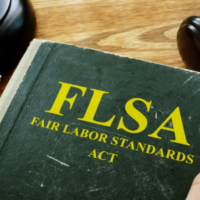New York Law Journal Publishes Article on Personal Jurisdiction in FLSA Collective Actions

Yankwitt LLP attorneys Michael Reed and Scott Wenzel examine personal jurisdiction in Fair Labor Standards Act collective actions and whether all opt-in plaintiffs must demonstrate their claims arose out of the defendant’s minimum contacts with the forum state. This was the topic of their article published in the New York Law Journal on April 13, 2023, “Specific Personal Jurisdiction in FLSA Collective Actions: The First Circuit Stands Alone.”
The article examines several cases that apply the precedent-setting 2017 Supreme Court ruling, Bristol-Myers Squibb v. Superior Court (BMS), to FLSA collective actions. In BMS, the Supreme Court held that plaintiffs must have a direct connection to the state where the suit is brought—even if out-of-state plaintiffs suffered similar injuries from the same prescription medication, Plavix, as the in-state plaintiffs. Thus, making clear that the state court did not have personal jurisdiction over plaintiffs who had not been prescribed, procured, or injured by Plavix in California, where the action was filed.
In the context of federal FLSA suits, however, Reed and Wenzel write that the question of personal jurisdiction over out-of-state, opt-in plaintiffs is not yet clear. The Third, Sixth, and Eight Circuit Courts of Appeal each found that the rules for federal suits are similar those found applicable in BMS, demanding that each plaintiff had to have connections to the state in which the FLSA collective action was brought—thus, absent general personal jurisdiction, barring a nationwide plaintiff class in an FLSA collective action.
But the First Circuit reached the opposite conclusion and found that a federal court had jurisdiction over plaintiffs with no connection to the forum state, provided the named plaintiff had sufficient connections to the forum state. “So long as the named plaintiff in a collective action satisfied the requirement of specific personal jurisdiction, the court has jurisdiction over claims brought by non-resident opt-in plaintiffs, too,” the authors explained the First Circuit’s decision.
Reed and Wenzel speculate that, for the time being, plaintiffs looking for a friendly collective action forum will file their suits in the First Circuit’s jurisdiction of Maine, Massachusetts, New Hampshire, Rhode Island, and Puerto Rico, and the Supreme Court will need to decide this significant circuit split eventually.
